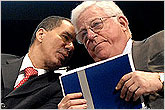 Jessica White/The New York Times
Jessica White/The New York Times We all know them. We avoid them on playgrounds. We shudder at their comments on parenting Web sites. They are the perfectly nice women who turn into mothers with strong opinions about how to raise children. Whether it’s VBAC vs. Caesarean, breast milk vs. formula, disposable vs. cloth or wraps vs. strollers, these moms know what they think and will stop at nothing to show you the light.
Are new mothers more judgmental about child-rearing than they used to be, or does it just seem that way? What’s the psychology and history of this mentality? It can’t all be hormonal.
- Ayelet Waldman, author, “Bad Mother”
- Ann Hulbert, author, “Raising America”
- Allison Pearson, author, “I Don’t Know How She Does It”
- Judith Warner, author, “Perfect Madness”
- Meredith F. Small, anthropologist
- Karen Karbo, novelist
- Leigh Goldman Balber, editor, UrbanBaby.com
- Cheli English-Figaro, co-founder, Mocha Moms Inc.
Too Much at Stake to Be Nice

Ayelet Waldman is the author of “Bad Mother: A Chronicle of Maternal Crimes, Minor Calamities and Occasional Moments of Grace.”
I sometimes wonder at our seemingly insatiable interest in the phenomenon of the mommy wars. This all runs contrary to most of our actual experience, which usually involves other mothers volunteering for emergency babysitting duty and dropping off elaborate meals when we’re recuperating from childbirth.
We go on the attack, we paint one another as bad mothers, when what we are really afraid of is that we might be one ourselves.
However, there is no denying that a current of sanctimony and even vitriol runs through the waters of contemporary motherhood. Five minutes on any one of the popular parenting Web sites is enough to find half a dozen screeds painting each mother as worse than the next. I often find that it is the most privileged women who engage in the worst kind of attacks.
While the urge to paint one another as bad mothers has always been there, it seems worse now than ever. I wonder if this is not because mothers today are of the first generation raised in a post-feminist world.
Remember Norine Schmittlapp?

Ann Hulbert, books editor at Slate magazine, is the author of “Raising America: Experts, Parents, and a Century of Advice About Children.”
Check out Mary McCarthy’s “The Group” (1954), and you’ll find two Vassar graduates sitting on a Central Park bench with their babies in 1939 — more than 70 years ago! — swapping childrearing expertise in a spirit that will sound familiar.
Mothers are a peer group that can exert very intimate pressure.
Anxious Priss Crockett is up on all the latest advice from the male scientific precincts, which has left her very confused (and acutely embarrassed that 2-year-old Stephen still isn’t toilet trained). She’s readily cowed by Norine Schmittlapp, who breezily dumps on those lab-obsessed experts as old fogies and swears by Margaret Mead and her cross-cultural perspective. She scoffs at uptight Priss’s panic about potty failures. Her own infant son, Ichabod, she’s sure, will “give up his anal pleasures” under peer pressure in nursery school.
In this deft scene, McCarthy (whose novel is full of astute social history) compresses a child-rearing-advice drama that helps put the current stage of maternal opinionizing in perspective.
Darwin Is to Blame

Allison Pearson is the author of “I Don’t Know How She Does It” and the forthcoming “I Think I Love You.”
Take one nice liberal woman who prides herself on being nonjudgmental. Now give that woman a baby. In no time at all, she could teach the Taliban a thing or two about rigid intolerance.
“Will you look at that poor kid! What sort of mother sends her child out dressed like that?”
Mother Nature programmed moms to be competitive so that our kids would be smarter and healthier.
The maternal brain is seemingly hardwired to record such acts of neglect and sartorial folly. (No dad has ever judged another father so.)
You don’t have to be a Mother Superior to find other moms selfish or clueless. Even Mothers Inferior such as myself can take an almost indecent pleasure in coming across moms who are wackier and more selfish than we are.
Insecurity and Hollow Choices

Judith Warner, a former columnist for nytimes.com, is the author of “Perfect Madness: Motherhood in the Age of Anxiety” and “We’ve Got Issues: Children and Parents in the Age of Medication,” which was published last month.
I’ve long thought that what defines this generation of mothers is the need for control and the belief that it is possible to control nearly every aspect of a child’s life, at least in the early years.
It’s as though our identities are on the line with decisions about the permissibility of dessert.
This reflex can translate into a distrustful, even defiant stance toward experts like pediatricians or other doctors. For many, the only knowledge worth having is found on one’s own, through Web sites or other sources that conform to a favored view of motherhood.
It seems to me that this posture comes out of insecurity and an over-investment in the choices we make as mothers. It’s as though, in making decisions about vaccinations, or preschools, or the permissibility of dessert, our identities are on the line each time.
Traditions vs. Opinions

Meredith F. Small is professor of anthropology at Cornell University and author of “Our Babies, Ourselves; How Biology and Culture Shape the Way We Parent” and author of the blog “The Anthropology of Everyday Life.”
The playground these days is more like the Senate floor than the coffee klatches of previous generations where mothers met to talk about anything besides parenting. Mothers now feel compelled to adhere to one “style” of parenting and to voice their opinions as a filibuster at the swing set.
We’re in this position because traditions of motherhood in the West are on the decline.
Parenting as politics would be startling for mothers in non-Western cultures where parenting is more about consensus than contention.
For example, Gusii mothers in Western Kenya do not feel a need to converse directly with babies because little ones can’t understand adults. !Kung San mothers of Southern Africa apply no corrective discipline on kids and tolerate everything, while mothers on Tonga in the South Pacific all agree that children are naturally bad and must be repeatedly punished to become good citizens.
It’s the Internet’s Fault

Karen Karbo, a novelist and memoirist, is the author of “The Gospel According to Coco Chanel: Life Lessons from the World’s Most Elegant Woman.”
It’s not motherhood, per se, that causes women to form strong opinions in regards to child rearing, but the information battering to which today’s new moms are endlessly subjected. A handful of friends are first-time moms, and what do they all tend to do after (or during) the 2 a.m. feeding? Check the Internet to see whether they’re supposed to be feeding the baby at 2 a.m. in the first place.
Now, we can doubt our parenting skills 24/7.
Mothers doubt themselves anyway, but in the olden days we only had to contend with the occasional advice of an insufferable mother-in-law, or the tips found in a magazine that arrived once a month. Now, we can make ourselves doubt our own parenting skills 24/7; five minutes on Google can convince you you’re the worst mother who ever lived.
How do mothers combat this? The same way people have always battled doubt and insecurity: tell someone whose opinion you disagree with that she’s an idiot. The mean-spiritedness and hostility of certain moms (most of it on the Internet — you don’t notice a huge uptick in the amount of brawls at Mommy and Me classes) stems from defensiveness: my way has to be right! If my way isn’t right, then I might be unwittingly raising a serial arsonist, or a politician.
Just Google ‘Parenting’

Leigh Goldman Balber is an editor with UrbanBaby.com in New York and the co-author of “The Journey to Parenthood: Myths, Reality and What Really Matters.”
My generation was taught that we could have choices — which also means having more to prove and being steadfast in defending those choices. When it comes to parenting techniques, that translates into the urge to demonstrate to others that we’re doing a good job raising our kids, whether we work outside the home or not.
The Web offers an arsenal of facts and opinions to prove we’re right.
It’s no wonder that some of the most heated discussions on UrbanBaby’s message boards — and we’re known for our no-holds-barred debates — are between stay-at-home moms and those who work outside of the home.
The other factor, of course, is the Internet. Mothers now have instant access to an incredible amount of information on parenting on the Web, with no issue too obscure not to have experts and self-styled mavens. (Just Google “parenting” and you get more than 54 million hits.)
Offer Support Instead

Cheli English-Figaro is a co-founder and the national president emerita of Mocha Moms Inc., a nonprofit support group.
Tiny pieces of your soul are surrendered to the children you raise and call your own. Through our children we become immortal and there is simply no other passion like the passion mothers have for their children.
We don’t have time to judge other mothers.
This passion can explain why some women become so judgmental about child rearing. But in my experience, quite the opposite is true. In my community of friends, which consists primarily of well-educated, married, African-American mothers, those statements actually explain why we refuse to pass judgment on each other.
A third of my friends work full-time outside the home. Another third are unemployed. And a final third have created a hybrid model that includes part-time, flex-time or work from home. Our employment models may vary, but we all twist ourselves into human pretzels for the sake of our children.








 Six authors read favorite passages from books they would never discard.
Six authors read favorite passages from books they would never discard. 

